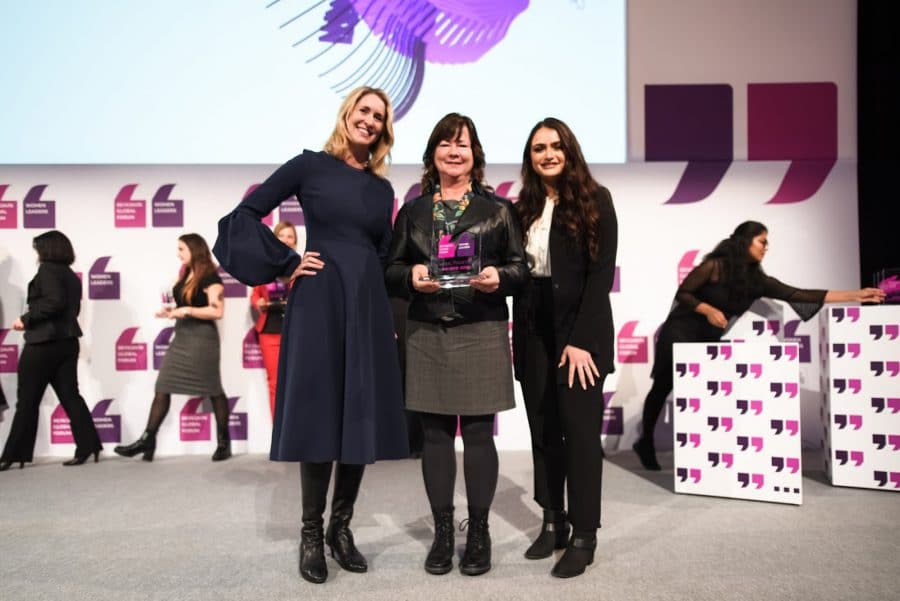The Reykjavík Global Forum Women Leaders presented The Kwek Society (Kwe’k means “women” in Potawatomi) with the Power, Together award in November 2019. Founded by Tribal member and Citizen Potawatomi Nation District 2 Legislator Eva Marie Carney, the nonprofit was one of 25 organizations recognized for their dedication to ending period poverty during the three-day conference in Iceland.
“The fact that people took the time and the opportunity to travel many miles and come together reflected that everybody there really had a commitment to lifting women up,” Carney said.
“That the forum organizers sought to bring together leaders in our particular movement, to share ideas, collaborate, and establish and enhance relationships beyond the conference, was so heartwarming,” she continued.

Only in its second year, the Global Forum invited attendees to Reykjavík to discuss women’s rights, economics, leadership and more. It referred to participants as “conversationists,” focusing on opportunities for interaction as opposed to listening to presentations or panel discussions.
“You are not just sitting there and being talked to; you’re part of the conversation. Everyone is invited to speak their minds,” Carney said. “Setting the tone for active participation, each conversationist is asked to make a pledge to do something concrete that will create forward momentum and positive change during 2020.”
Founded in 2018, the Kwek Society is still new to the nonprofit world, and many leaders of organizations with the same goals were unaware of its existence.
“Other period poverty activists attending the conference knew each other from varied interactions, but they weren’t familiar with The Kwek Society. When we gathered for an informal dinner before the awards ceremony, other organization leaders were eager to hear about us, since we are new on the scene,” Carney said.
“There’s no doubt that we are small potatoes. The caliber of people receiving the Power, Together awards was impressive. Most of them operate on the world stage. Nonetheless, I strove to learn as much as I could from them, to enhance my operation of The Kwek Society to better serve the interests of Native k’wek (women).”
Carney described the forum as “a happy blur of activity,” and the presence of many young women attending the forum gave her hope for the future.
Goals and connections
The American Medical Women’s Association defines period poverty as “the inadequate access to menstrual hygiene tools and educations, including but not limited to sanitary products, washing facilities and waste management.”
For younger women in remote and/or impoverished areas, the costs that accompany their menstrual cycles could result in missed school days, health threats and embarrassment. The Kwek Society works with Native American communities to provide pads, tampons, liner, underwear, puberty education books and more to partners for distribution. Carney’s forum pledge focused on the growth of the organization.
“I decided to make our pledge doable, so I focused on expanding beyond the United States to Canada, because I know that there are significant numbers of Native students, including Three Fires students, in Canada who have this need,” Carney said. “And I included in our forum pledge that we would reach at least 50 school programs in 2020.”
The Kwek Society currently works with more than 35 partners in New Mexico, Oklahoma, South Dakota and Wyoming. After the forum, Carney established a new relationship with the Parry Sound High School in Ontario, Canada, assisted by a Potawatomi Wasauksing First Nation elder. Many tribal students attend the school, and they will benefit firsthand from Kwek Society donations.
“By December 2019, we met our goal of being international,” Carney said.
During the Reykjavík forum, other Power, Together award winners brought samples of the period products they distribute. Carney evaluated a range of possibilities, including washable underwear, reusable supplies and ovulation tracking devices.
“I never want to make conclusions for our students that we’re serving as to what they should be using,” Carney said. “Being exposed to options will allow me to intelligently discuss with those we help what’s available, and perhaps move them a little bit toward period products they otherwise wouldn’t consider — especially options that could not only be comfortable but might save students money and protect Mother Earth.”
During the forum, Carney forged a bond with Celeste Mergens. She is the founder and CEO of Days for Girls, another Power, Together award recipient that is a long-established global reusable products supplier. Days for Girls has offered to supply The Kwek Society with thousands of dollars of new underwear, pads and tampons for distribution.
In late spring 2020, Mergens will accompany Carney and a Kwek Society board member residing in New Mexico on their visits to local schools the organization supports. Carney plans to introduce Mergens to the nonprofit’s New Mexico partners and hopes to solidify The Kwek Society’s relationship with the schools and its partnership with Days for Girls.
Carney is also in discussions with I Support the Girls, a nonprofit headquartered in Maryland near her home, regarding distribution of sports bras through The Kwek Society to Oklahoma public schools with significant Native populations. Carney says networking and connections are the “way to be” and that The Kwek Society is “all about ensuring dignity and human rights across our Native communities.”
Carney welcomes all suggestions for schools in need, foundation donors to contact and volunteers looking to contribute. Read more about the Kwek Society at cpn.news/kweksociety and kweksociety.org. Visit the Reykjavík Global Forum Women Leaders online at reykjavikforum.global.
